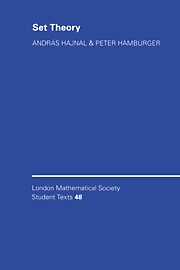Preface
Published online by Cambridge University Press: 10 May 2010
Summary
Aus dem Paradies, das Cantor uns geschaffen, soil uns niemand vertreiben können.
(No one can chase us out of the paradise that Cantor has created for us.)
David HilbertThis textbook was prepared on the basis of courses and lectures by András Hajnal for mathematics majors at Roland Eötvös University in Budapest, Hungary. The first edition appeared in 1983 since then the book went through a number of new printings and editions. During each of these, new problems were added and the historical remarks were updated. A number of revisions have also been made in the present, the first English, edition. A significant one among these is that hints were added for the problems in Part II, and a completely new section (Section 20) discusses the so-called square-bracket symbol.
The book consists of two parts and an Appendix to Part I. The first part contains a detailed non-axiomatic introduction to set theory. This introduction is carried out on a quite precise, but intuitive level, initially presenting many of Cantor's original ideas, including those on defining cardinals and order types as abstract objects. Only later, in Sections 8–11, do we discuss von Neumann's definition of ordinals and prove results important even for mathematicians working in various areas other than set theory. This part is well suited for a one-semester undergraduate course, and it is generally used in Hungarian universities. As is customary in mathematics textbooks at Hungarian universities, each assertion announced in the text is accompanied by a complete and detailed proof.
- Type
- Chapter
- Information
- Set Theory , pp. vii - viiiPublisher: Cambridge University PressPrint publication year: 1999

